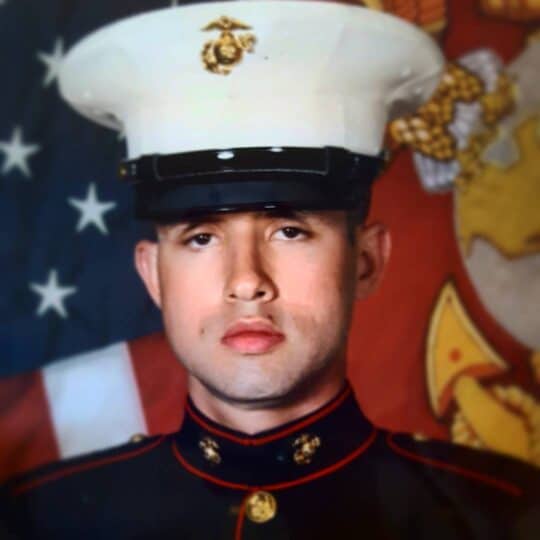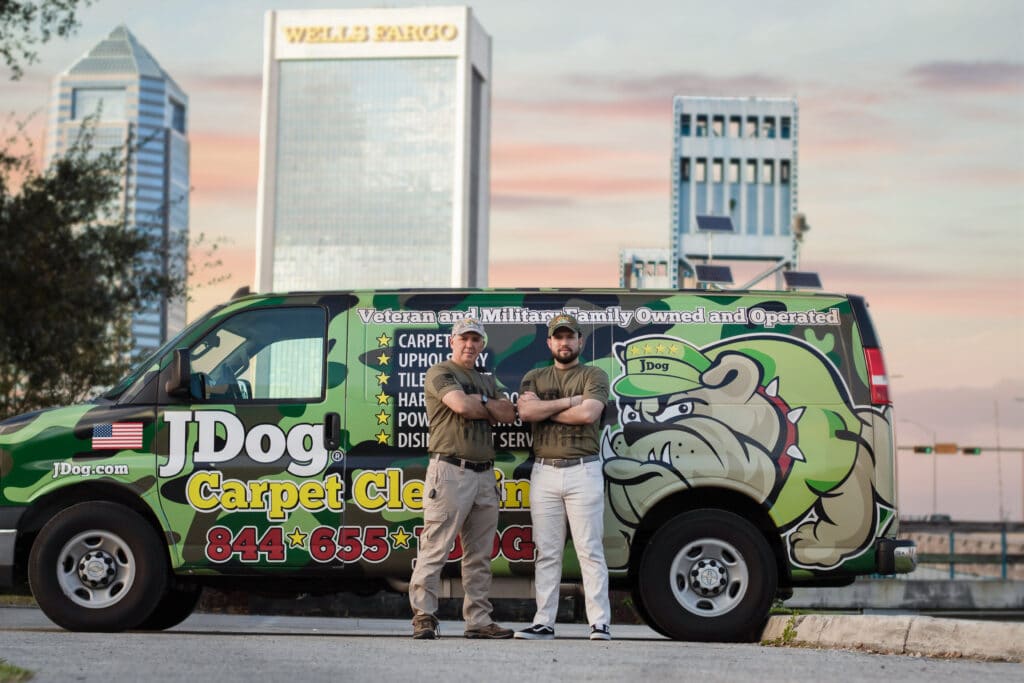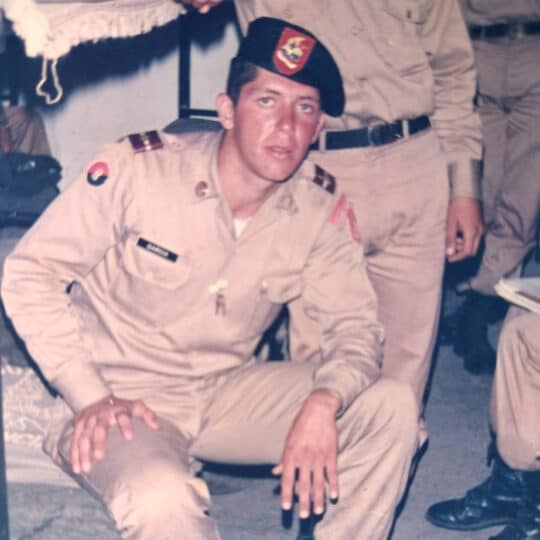Hispanic Heritage Month: Honoring Hispanic JDog Business Owners

JDog is honoring the many contributions made by Hispanic Americans to our nation during National Hispanic Heritage Month, an annual commemoration held September 15 to October 15. Each year, this time is set aside to celebrate the history, achievements, culture, and contributions of Hispanic Americans.
One area specifically in which Hispanic Americans have dramatically contributed to is entrepreneurship. As the Hispanic American population increases, Hispanic entrepreneurs are becoming one of the key growth engines for our economy. In fact, the number of Hispanic-owned businesses is growing at more than twice the rate of non-Hispanic businesses.
We are very proud of our JDogs of Hispanic heritage. Two of these JDogs are Fernando and Juan Garcia, who both emigrated from Columbia to the United States. Fernando owns JDog Carpet Cleaning & Floor Care Jacksonville and runs it with Juan. Hear from the father/son duo as they discuss their background, heritage and entrepreneurship.

Fernando (left) and his son Juan (right) In front of their JDog van
Tell us about your background and heritage
Fernando:
Yo nací y crecí en un pequeño pueblo en las montañas al noreste de Colombia, posteriormente nos fuimos a la ciudad donde conocí a mi esposa Geraldine quien también fué mi compañera de estudios en la Carrera de negocios internacionales; allá nació nuestro primer hijo Juan Jose. En 2006 emigramos a USA como refugiados y comenzamos una nueva etapa de nuestras vidas. Al unAño de vivir aquí, nació nuestro Segundo hijo Santiago, comenzamos el proceso de adaptación a la nueva vida, aprendimos un nuevo idioma, cultura, costumbres y lo más importante, a amar nuestro nuevo país.
“I was born and raised in a small town in the mountains of northeastern Colombia. I later moved to Bucaramanga where I met my wife Geraldine, who was also my fellow student in the international business Bachelor’s; Our first son Juan José was born there. In 2006 we immigrated to the USA as refugees and began a new stage in our lives. A year after living here, our second son, Santiago was born. We began the process of adaptation to the new life, we learned a new language, culture, customs and most importantly, to love our new country.”
Juan:
Cuéntenos sobre su herencia: Somos originarios de Bucaramanga, Colombia y emigramos a los Estados Unidos hace 16 años directamente a Jacksonville, Florida como refugiados. Mi hermano pequeño, el primer estadounidense nacido en nuestra familia.
“We are originally from Bucaramanga, Colombia and immigrated to the US 16 years ago directly to Florida as refugees. My little brother is the first American-born in our family.”
Tell us about your Military experience
Fernando:

Fernando in the Columbian Army
Yo serví en el ejército de Colombia , Batallón Guardia Presidencial, Compañía de infantería, al final de los 80s. Fueron tiempos difíciles por la situación interna del país acosada por guerrillas comunistas y carteles de traficantes de Drogas.
“I served in the Colombian Army, Presidential Guard Battalion, Infantry Company, between in the late 80’s. These were difficult times due to the internal situation of the country, harassed by communist guerrillas and drug traffickers’ cartels.”
Juan:


What does hispanic heritage month mean to you and how do you celebrate it?
Fernando:
Siempre he creído en fortalecer las raíces para dar mejores frutos, festejar nuestra herencia hispana, hacer recordar de dónde vienen nuestros valores personales y hacen manifestar las diferentes culturas Latinoamericanas que hacen parte de la gran herencia hispana que da sus frutos en estas magníficas tierras.
“I have always believed in strengthening the roots to bear better fruit, celebrate our Hispanic heritage, remind us of where our personal values come from and, manifest the different Latin American cultures that are part of the great Hispanic heritage that bears fruit in this magnificent nation.”
Juan:
¿Qué significa para ti el mes de la herencia hispana y cómo lo celebras? La herencia hispana nos hace sentir ante todo bienvenidos. Presenta el simple, pero enorme, significado de que también somos estadounidenses. No es diferente de otros con herencia de otras partes del mundo que han llegado a esta nación y han contribuido a su grandeza. Estados Unidos es un crisol de culturas, y el mes de la herencia hispana que destaca nuestra herencia significa que la comunidad hispana tiene un lugar y una oportunidad para contribuir a esta gran nación. Celebramos reconociendo e informándonos a nosotros mismos y a los demás en los muchos roles que nuestra comunidad ha dado forma a la nación, desde Sonia Sotomayor, hasta nuestros dueños de negocios latinos locales, al igual que mi papá y yo.
“Hispanic heritage makes us feel first and foremost welcomed. It brings forth the simple, yet huge, meaning that we are also Americans. No different from others with heritage from other parts of the world that have come to this nation and contributed to its greatness. The U.S. is a melting pot, and Hispanic heritage month highlighting our heritage means that the Hispanic community has a place and chance to contribute to this great nation. We celebrate by recognizing and informing ourselves and others in the many roles our community has shaped the nation, from Sonia Sotomayor, to our local Latino Business owners, just like my dad and I.”
Share with us your personal experience as being a Hispanic entrepreneur
Fernando:
Como cualquier persona, emprender una empresa no es facil y siempre tiene las mismas dificultades para todos, sin embargo ser emprendedor hispano me hace sentir muy orgulloso junto a los muchos emprendedores latinos, ayudamos a hacer que este país sea mas grande y bendecido.
“Like anyone, starting a business is not easy and it always has the same difficulties for everyone, however being a Hispanic entrepreneur makes me feel very proud along with the many Latino entrepreneurs, we help make this country bigger and more blessed.”
Juan:
¿Comparte con nosotros su experiencia personal como emprendedor hispano? Mi experiencia personal como emprendedor hispano es desafiante y gratificante. En primer lugar, nos enfrentamos a los mismos desafíos que cualquier otro emprendedor. Pero además de eso, ahora somos parte de una comunidad donde la diversidad aún no es prominente, pero está creciendo. La etnia más común de los dueños de negocios en los EE. UU. Es la blanca (72,6%), seguida de la hispana / latina (13,0%) y la asiática (6,1%). Hay dos desafíos distintos que enfrentamos como minoría: acceso limitado al capital y acceso limitado a las redes comerciales. Por el contrario, con la ayuda de JDog, pudimos enfrentar estos desafíos de frente. Fue una oportunidad asombrosa. Ha sido muy gratificante formar parte del creciente porcentaje de propietarios de negocios y liderar, inspirar a otros con la actitud de poder hacer que siempre ha definido a esta nación, y promover los valores de JDog en los que creemos profundamente.
“My personal experience being a Hispanic entrepreneur is both challenging and rewarding. We face the same challenges as any other entrepreneur. But on top of that, we are now part of a community where diversity is not yet prominent, but it’s growing. The most common ethnicity of business owners in the US is White (72.6%), followed by Hispanic/Latino (13.0%) and Asian (6.1%). There are two distinct challenges we faced as a minority: limited access to capital, and limited access to business networks. In contrast, with the help of JDog, we were able to face these challenges head on. It was an amazing opportunity for us. It has been super rewarding becoming a part of that growing percentage of business owners that is leading, and inspiring others with the can-do attitude that has always defined this nation, and promoting the JDog values that we deeply believe in.”